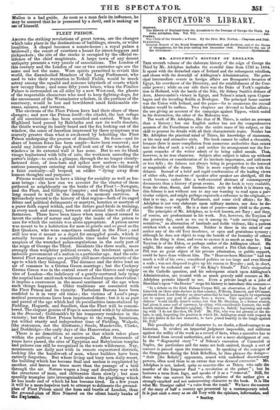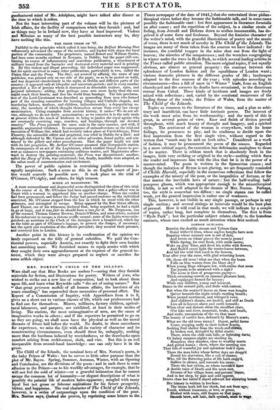SPECTATOR'S LIBRARY.
EMORY, The History of England from the Accession to the Decease of George the Third. By
John Adolphus, Esq. Vol. VII. Lee. POMMY, The Child of the Islands ; a Poem. By the Hon. Mrs. Norton.. • Clap tat and Bail. STATISTICS,
General Report of the Royal Hospitals of Bridewell and Bethiem, and of the House of Occupations, for the year ending Slat December Iftst. Printed for the use of the Governors Spoitinsoodt.
MR. ADOLPHUS'S HISTORY OF ENGLAND.
THIS seventh volume of the elaborate history of the reign of George the Third by Mr. Adolphus includes the eventful time from 1795 to 1804. It opens with the disturbed state of Ireland and the subsequent rebellion, and closes with the downfall of Addington's Administration. The prin- cipal intermediate events in foreign affairs are Bonaparte's invasion of Egypt, his overthrow of the Directory, and the establishment of the Con- sular power; while on our side there was the Duke of York's capitula- tion in Holland, with the battle of the Nile, Sir Sidney Smith's defence of Acre, Abercrombie's victory in Egypt, and Nelson's attack upon Copen- hagen and the invading flotilla at Boulogne. The principal home matter_ was the Union with Ireland, and the peace—for to enumerate the eternal debates would be endless. Two chapters are devoted to Indian affairs - the one giving an account of the campaign against Tippoo, which ended in his destruction, the other of the Mahratta. war.
The work of Mr. Adolphus, like that of M. Thiers, is rather an account
than a history ; but our English author has not the comprehensive acumen of the Frenchman to seize the entire mass of his subject, or the skill to present its details with all their characteristic traits. Neither has Mr. Adolphus the practical mind of Thiers, his knowledge of statesmen, or his easy and attractive style. The book cannot be called a chronicle, because there is more compilation from numerous authorities than enters into the idea of such a work ; and neither its arrangement nor the fre- quent remarks of the writer admit of its being called annals. That, however, is its true character. Subject after subject is taken up without much selection or consideration of its intrinsic importance, and told more or less fully; the fulness not always being in proportion to the interest or magnitude of the theme. This is more especially the case with the debates. Instead of a brief and rapid condensation of the leading views of either side, the orations of speaker after speaker are abridged, till the work becomes rather like a well-executed abstract of contemporary documents than a history of great events. As the book is very readable, from the clear, fluent, and business-like style in which it is drawn up, this fulness is not without use to any one wanting to read upon a par- ticular subject, and might perhaps supersede a reference to the originals,— that is to say, as regards Parliament, and some civil affairs ; for Mr. Adolphus is not very elaborate upon military matters, nor does he de- scribe them very well. He is a man of peace—ams yield to the gown. The principles of Mr. Adolphus' as is well known, are Tory; and they, of course, are predominant in his work. Not, however, the Toryism of the present day, such as we see it among its "sole surviving repre- sentatives," an alternation of lassitude and feeble violence, like a patient stricken with a mortal disease. Neither is there in the mind of our author any of the old Tory insolence, or open and gratuitous tyranny ; although he does not object to reap the benefit of the brutality of others when the thing is done, and even to excuse it as much as may be. Hie Toryism is of the Eldon, or perhaps rather of the Addington school. He might, like many others of the class, attend a Pitt Club dinner ; but Pitt was no great object of his private admiration, or public support, could he have done without him. The " Heaven-born Minister " had too much a will of his own ; considered politics on too large and even liberal a scale ; was not disposed to give up his reason to Royalty ; and, in short, could not be reckoned one of " the King's friends." Pitt's resignation on the Catholic question, and his subsequent attack upon Addington's Administration, are treated with as much gravely mild censure as Mr. Adolphus permits himself to use. Even a private laugh at a joke of Sheridan's upon " the Doctor " stops his history to introduce this censure— "Ina debate on the Irish Habeas Corpus Bill, an observation of the Earl of Limerick on three state doctors in that country, N'Nevin, Emmett, and O'Connor, produced from Lord Darnley an observation that he had been taught by experience not to expect any good in polities from a doctor. This specimen of 'gentle dulness' would hardly deserve notice, but that Mr. Sheridan, m a former session, had given it some sort of currency, by citing, with considerable humour, the well. known imitation of Martial's epigram, Non ono te, Sabidi,' beginning and end- ing with do not like thee, Dr. Fell. Mr. Pitt, who was not present at the de. bate, is said, forgetting the position in which Dr. Addington stood with respect to his own father in his last moments, to have joined heartily in the laugh against Dr. Fell."
This peculiarity of political character is, no doubt, a disadvantage to an historian. It renders an impartial judgment impossible, and militates against the utility of the work as a record of facts, when a narrative has to be formed from several authorities, and is not a mere abridgment of one. In the " disgraceful story " * of Nelson's execution of Caraccioli at Naples, the particulars and the name are both omitted, though a sort of censure is.passed upon the transaction. In speaking of the outrages of the Orangemen during the Irish Rebellion, he thus phrases the doings- " their [the Rebels'] opponents, armed with undefined discretionary powers, often used them to an extent that was deemed excessive." Mn Adolphus is not, indeed, quite so courtier-like as Thiers, who calls the murder of the Emperor Paul "a revolution at the palace";_ but he borrows a term from lago and speaks of it, as a " removal." Still, for those who can correct his errors, the opinions of the author give a strongly-marked and not uninteresting character to the book. It is as what Mr. Thesiger called "a voice from the tomb." We have the essence of the story of half a century ago presented by a contemporary mind It is just such a story as an old Tory with the opinions, information, and
.* Southey.
goodnatured mind of Mr. Adolphus, might have talked after dinner at the time to which it refers.
Not the least interesting part of the volume will be the pictures of Irish affairs, for the facility of comparison which they furnish : and, bad as things may be in Ireland now, they have, at least improved. Violent and Milesian as many of the best possible instructors may be, they have nothing like this. THE IRISH PRESS OF '97.
Faithful to the principles which called it into being, the Belfast Morning Star Vehemently advocated the cause of the societies, and loaded with abuse the loyal portion of the community. The proprietors, named Robert and William Simms, had been some months confined in Newgate, in Dublin; but the paper still con- tinuing its course. of inflammatory and scurrilous publication, a detachment of Milken/ issued from, the barracks and destroyed every material used in printing it. By this violent and illegal proceeding, the individual paper was suppressed; but its spirit survived in many other publications, particularly in two, called the Union Star and the Press. The Star, not avowed by affixing the name of any publisher, was printed only on one side of the pap so as to be pasted on walls, and was dispersed clandestinely in the night, in Dublier, n and different parts of the country: it appeared only at irregular and uncertain periods; and in every number presented a list of persons whom it denounced as detestable traitors, spies, and perjured informers: adding, that perhaps some arm more lucky than the rest might reach their hearts, and free the world from bondage. The late proclama- tion of the Lord-Lieutenant was described as proceeding from men who formed part of the standing committee for burning villages and Catholic chapels, and murdering fathers, mothers, and children, mdiscriminately; a depopulating so- ciety, the members of which thought themselves secure from every law except assassination. Citing examples from ancient history, it said—" We do not ad- vise, although we do not decry, assassination; as we conceive it is the only mode at present within the reach of Irishmen to bring to justice the royal agents who are constantly exercising rape, murders, and bunungs, through our devoted country." The Press pursued the same ends in the same manner, and with, if Possible, augmented virulence. In consequence of animadversions on the trial and execution of William Orr, which had recently taken place at Carrickfergus, Peter Ymnerty, the ostensible edifor and proprietor, was tned in Dublin for a libel; and although. defended by Mr. Curran and six other advocates, found guilty, and sen- tenced to the pillory and other punishments. That the paper might not sink with its late proprietor, Mr. Arthur O'Connor assumed that disreputable station. rn consequence of an act of the Legislature, which enabled Grand Jurors to pre- sent as nuisances newspapers containing seditious matter, and Magistrates after- ward to destroy the .printing-materials, the Press was discontinued: another, called the Harp of Ersn, was substituted; but, finally, handbills were adopted, as the safest mode of communication and excitement.
The power of public opinion in restraining public indecorums is equally auspicious. Such a scene as this in an English court of jus- tice would scarcely be possible now. It took place on the trial of O'Connor, O'Coigley, and others, for high treason.
scrum AT MAIDSTONE: '98.
A most extraordinary and disgraceful scene distinguished the close of this trial. In the course of it, Mr. O'Connor had been apprized that a police-officer was in Court with a warrant" to appiehend him on another. charge. When the verdict Rad been pronounced, and before the Judge had passed sentence on the individual eCnyieted, .Mr. O'Connor stepped from the box in which he stood with the other
ers, and attempted to escape. Being opposed by the. Bow Street officers,
urd Thanet, one of his witnesses, declared that, being acquitted, he had a right to. go at large, and it was fair he should have a run/or it. Mr. Fergusson, one of the counsel, Thomas Gunter Browne, Dennis O'Bnen, and some others, assisted in his endeavour to escape; a riotous'scuffie ensued; some of the lights were extin- guished; an assistant to the Clerk of the Arraigns drew a broadsword, which lay en the table as part of O'Connor's luggage, to protect the Judges, if necessary; but the spirit and resolution of the officers prevailed; they secured their prisoner, and conveyed him to London.
Another point in this history is its confirmation of the opinion we lately expressed on the folly of general subsidies. We paid the Con- tinental powers, especially Austria, not exactly to fight their own battles but something more. We furnished means to equip armies with which they sought their own aggrandizement at the expense of the general in- terest, which they were always prepared to neglect or sacrifice for some selfish object.



























 Previous page
Previous page